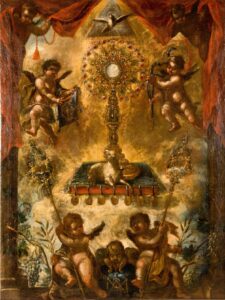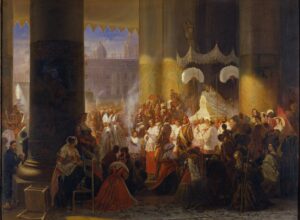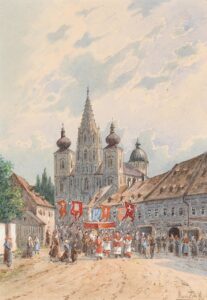Corpus Christi
This feast, which we refer to as Corpus Christi, is known to the French as la Fête-Dieu, an expression that carries a double meaning. It is the Feast of God, for on it we honour God who is among us in the Most Blessed Sacrament, but it is also a feast that God throws for us by inviting us to share in the banquet He has prepared. If we throw a feast today, it is because He threw a much bigger one that has been ongoing for nearly 2,000 years and is destined to lead to the eternal banquet of Heaven.
Last week, we considered that, although humans can arrive at the knowledge of God’s existence through the powers of their own intellect, we could never have imagined that God is actually a Person and, what’s more, a communion of Three Persons. Today, we have a similar observation to make: if Our Blessed Lord had not instituted – let’s say invented – the Blessed Sacrament, it would never have occurred to anyone to do so. Only God can come up with these things!

Indeed, the institution of the Holy Eucharist was God’s way of achieving two things that seem impossible, and indeed are impossible, for us. The first is to remain present here on earth while at the same time leaving the earth and going back to Heaven. The second is devising a means of making the unique event of the Sacrifice of Calvary present throughout the ages without multiplying the event itself. These are the two most astounding miracles that Our Lord performed during His earthly existence, and both were enacted at the Last Supper when He instituted this Most Blessed Sacrament.
It should now be obvious that the depth of the mystery is such that we could speak of it for hours and hours without hardly beginning to explain its mysteries. For today, let us dwell only upon a few aspects of the mystery of Holy Communion. When Our Lord institutes the sacrament, He begins by saying: Take and eat; take and drink. The Eucharist is ordered to Holy Communion because it is the divine means that is given to us so that we may live by feeding on God Himself.
Our Lord tells us in St John: As the living Father hath sent me and I live by the Father: so he that eateth me, the same also shall live by me (Jn 6:58). With these words, we are taken back into the mystery of the Trinity. The life that we are given in Holy Communion is the very life of God. Just as it is the Son’s union with the Father that gives Him to live eternally, so our union with Christ gives us to live eternally; in other words, when we receive Holy Communion, we are plunged, as it were, into the mystery of the Triune God, and we partake of the eternal life which is His for all eternity.
This truth is so profound that it has been rightly said that if we fully realised what happens in Holy Communion, we would die. If God gave us the ability to see clearly what happens in Holy Communion, our frail bodies would not be able to bear the utter joy and bliss that would overwhelm us and cause our hearts to burst. That is why He hides the reality from us and why He veils Himself under the appearances of bread and wine. What does happen when we communicate? Unlike the eating of other foods, which cease to be when they are eaten and end up becoming part of our bodies, when we eat the Holy Eucharist, we do not convert Christ into ourselves, but He converts us into Himself. This is why St Augustine said that when you eat the Body of Christ, you become the one you eat; you become Christ.
When this dawns on us, our approach to Holy Communion changes, and we can be, as it were, pulled in two different directions. One is to be so overcome by the majesty of the presence of Christ that we fear to approach. This is why Our Lord commands us to come forward. If He had not done so, who would dare to? The other is to be so in love with Christ that we cannot wait to go to Him.
It has been said of certain saints that they used to spend the entire day contemplating the Holy Eucharist. The hours before Communion were spent in preparation, and the hours following in thanksgiving for such an ineffable gift. This instructs us on how we are to approach the Blessed Sacrament. We must first of all have faith in the Real Presence. Christ is truly there, whole and entire, with His Body, Blood, Soul and Divinity. We must also have charity, that is to say, be in a state of grace. If we have the misfortune of committing mortal sin, we must first go to Confession before receiving. Otherwise, we abuse the Sacrament and commit a sacrilege. Indeed, sacraments are not magic. Their fruitful reception requires faith and love, and the more faith and love we have, the more it will profit us.
There are also physical preparations that are required. We must observe some fasting. The minimum time is one hour before Communion, but if possible, we are encouraged to maintain the traditional fast of three hours, or even from midnight when Mass is early in the day. Our ancestors were so deeply conscious of the dignity of the Blessed Sacrament that out of respect for it, they made sure it was the first food they consumed. Another physical preparation is to be dressed with modesty and dignity. We must not approach the Lord of Glory dressed in a way that would draw undue attention to ourselves, nor in a casual manner as if we were going to the gym. If we would put on our very best to an audience with an earthly King, how much more when we are privileged to approach the King of Glory?
When we possess these proper dispositions, we are encouraged to receive Holy Communion as often as possible. Indeed, Pope St Pius X promoted daily Holy Communion as being the most powerful remedy of grace to assist the soul in avoiding sin and living a holy life. Since Christ Himself in person is present, the power of the Blessed Sacrament is such that we can say it is nearly impossible for a good and upright soul to resist the action of grace received through daily Communion, as long as one receives seriously, humbly and with a good heart, that is to say, the desire to please God and to grow in virtue. St Pius X also made sure that children could receive Our Blessed Lord from the time they had sufficient use of reason to understand that the Eucharist is no ordinary bread, for this holy pontiff knew that it was the most potent remedy against the attacks of temptation. This is so true that if one receives Our Lord worthily and daily, there is no weakness of the soul that cannot be overcome by reason of the flood of sacramental grace received.
This is all the more true when we spend some time in thanksgiving after Holy Communion. In order to live, it is not enough to eat; one must also digest. Instead of rushing outside as soon as Mass is ended, we should stay for at least a few minutes, for Holy Communion is “digested” properly only in adoration and silent prayer, allowing Our Lord to speak to our heart and impress upon us His holy virtues, opening us up to pursuing our contemplation forever.
Now we understand better the meaning of la Fête-Dieu. When we receive worthily, we are united with God Himself and with all those who are united to God: that is to say, all the angels and saints in Heaven and all the holy souls on earth. There is no separation for those who are in Christ Jesus. May He lead us all through the intercession of Our Lady, Mother of the Eucharistic Heart, through this valley of tears to the joys of His eternal kingdom and banquet.


